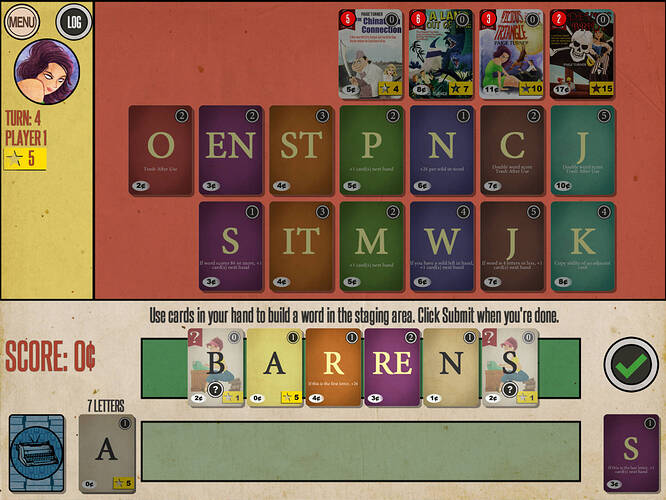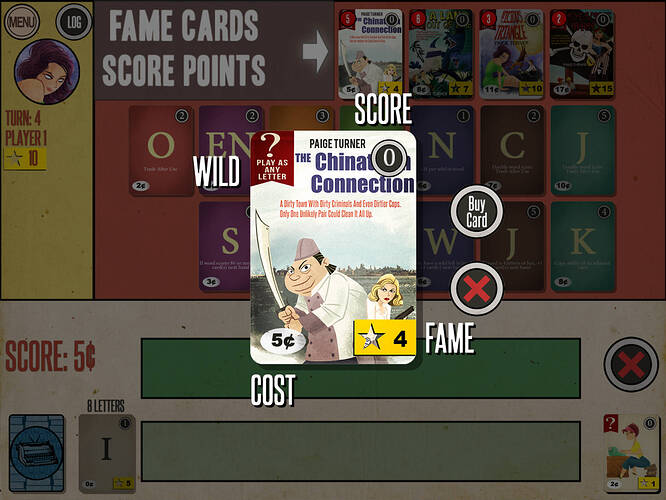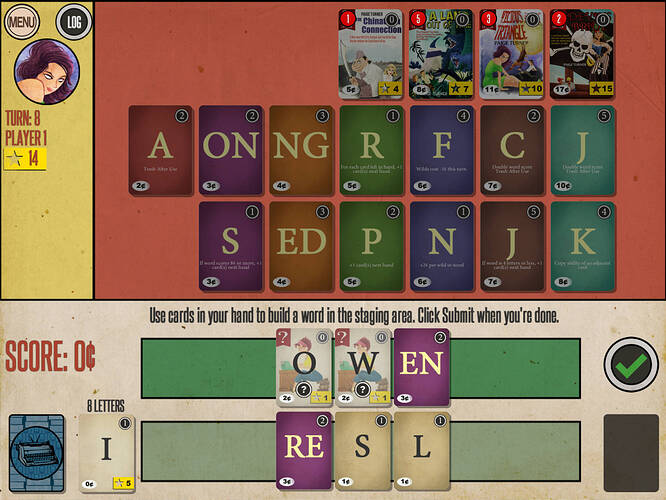Originally published at: http://statelyplay.com/2016/11/18/review-paperback/
Everyone hates words games. It’s true. Well, almost everyone. Your grandma still loves Scrabble, and so does that one tool who’s memorized every two-letter word that begins with “Q”. Do we want to game with those people? Hell, no! (Grandma excluded. It’s fun to game with grandma!) What if I were to tell you that there was a word game that didn’t suck? What if we took one of the most popular games of the past 10 years and mixed it with word games? How would that work?
Let’s take a look at Paperback.
Paperback is a word game mixed with the grand daddy of all deckbuilders, Dominion. Or maybe it’s closer to Ascension? Doesn’t matter. What matters is that you begin with a deck of 10 cards containing the letters RSTLN and five Wild cards that can sub for any letter. Each letter (not wilds) is worth a certain value and when you build words, you’ll add up the value of all your cards and get to buy more cards from a central card row. These cards can be individual letters or pairs of letters that you have to use as-is. That is, if you buy “SE” you can use it to spell “USE” or “EASE”, but not to spell “BEES”. Make sense? Of course, the cards you buy have their own values with harder letters giving you more money when you use them in later rounds.
[caption id=“attachment_365” align=“aligncenter” width=“2048”]
Going back to my WoW days.[/caption]Sounds easy, but that’s not all. Some of the letters you buy also have special abilities on them that trigger if used in a word. These can be simple such as “+1 card next hand”, but can easily depend upon the words you build such as “If word is 7 letters or longer, +3¢”. It’s these powers on cards that might make you grab a “J” or “X” instead of a “T” as you look for combinations that can build up big cash values in later turns which allows you to earn Fame.
Fame (points) is earned by buying “novel” cards, which are simply Wild cards that are worth points. The game ends if any two piles of these novel cards are empty, with the winner being the one with the most points collected.
[caption id=“attachment_366” align=“aligncenter” width=“2048”]
It makes a man think things over.[/caption]There are other mechanisms here as well, such as a community vowel card that everyone can use to help them build words and which you can collect if you build a word of a certain length or more. This adds a valuable vowel to your deck, but each of these cards is also worth points at game’s end.
Paperback succeeds where Scrabble fails by eliminating the randomness of drawing tiles that suck, and adding the Wild cards which make building words easier even for those of us without English degrees. I can play against my kids and, while I’ll eventually pull ahead, they can definitely piece together words and keep the game rolling. They’ve even started to figure out certain card combos which can give them some hefty word values while still hovering around a middle school vocabulary.
[caption id=“attachment_367” align=“aligncenter” width=“2048”]
Legend is, we spell his name three times and he appears in the mirror.[/caption]Also eliminated are the 20 minute long turns as your “friend” stares at his tiles trying to build an 8-letter word to pick up a triple-word score. Turns in Paperback are surprisingly quick due to the Wild cards which give you freedom when you’re looking for just the right vowel, but also remove the pressure of having to build a massive word. The fact that Wild cards earn you zero cash to buy more cards removes the impulse that you have to use all your cards. If you only have three letters and the rest are wilds, go ahead and spell “CAT”. Take your three cents and draw up another hand.
The app for Paperback is a bit on the spartan side. It’s a digital port of a card game, period. There are no bells and whistles, and that’s okay for the most part. It has three levels of AI to play against with the easy being far too easy and the hard being adequate, and there’s also pass-and-play multiplayer. There’s currently no online multiplayer, however, and the “tutorial” is more of a slide show that you can’t reference in-game. There is in-game help, however, and the game is simple enough to pick up that I don’t think anyone who’s played a deckbuilder would have much trouble hitting the ground running.
If you’ve soured on word games in the past, give Paperback a whirl. It’s the best, and only, word game I’m willing to play and the app works fantastic as a quick filler when you’ve got a minute or two to kill.
Paperback was designed by Tim Fowers who has designed some other fantastic tabletop titles such as Wok Star. Here’s hoping that Paperback is only his first foray into the digital scene and we’ll see more of his work on our tablets in the future.



